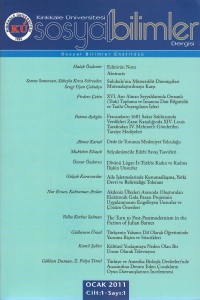The Turn to Post-Postmodernism in the Fiction of Julian Barnes
Abstract
Mevcut makale, üst-anlatıların postmodern ölümlerinden sonraki dirilişinin, yeni, müteakip devrin yükselişi için temel olarak hizmet ettiğini; ki bunun da post-postmodernizm olarak bilindiği konusunu, ele almaktadır. Julian Barnes’in romanlarında, çok başarılı bir biçimde tasvir edilen bu süreç incelenecektir. Kendi dibini kazması ironisi, umutsuzluğu, kötümserliği ve ufukta görünen sonu ile postmodernizm çağı; dünyayı kopyaların ve aşağılığın baskınlığı, melezlerin şöhreti, belirsizlik, yokluk ve anti-teorik sonuçsuzluk tarafından karakterize edilmiş umutsuzluk içinde bıraktı. Dolayısıyla, doğal olan, insanoğlunu bitmez tükenmez anlam boşluğundan kurtarmak için, üst anlatıların yeniden kurumlaşması zorunlu bir takım çağrıları olarak meydana geliyor, ki doğal olanın bu belirişi, ancak ütopik anlatıların başarısının ortaya çıkması ile güven duygusuna vesile olabilir. Julian Barnes’ın kurgusu da aynı özellikleri barındırıyor. Bir çokları yazarın yapıtlarını postmodernin tipik bir örneği olarak dikkate alırken, aslında böyle olmaktan oldukça uzak, bunun ötesinde yazarın asıl vurgulamak istediği post-postmodernizm aşamasında anlam farklılığının çeşitliliğine rağmen tek bir doğrunun varlığı, üst-anlatıların ve ‘fabülasyonun’ insanoğlunun yaşam sürecindeki rehberlik rolünün önemidir
Keywords
References
- Barnes, J. (1989). A History of the World in 10 ½ Chapters. London: Picador. ---. (2007). “The Past Conditional. What Mother Would Have Wanted.” The New Yorker, 25, 56.
- Buxton, J. (2000). “Julian Barnes’s Theses on History (In 10 ½ Chapters).” Contemporary Literature, 4 (1), 56-86.
- Byatt, A. (1979). People in Paper Houses. London: Edward Arnold. Elias, A. (2001). Sublime Desire: History and Post-1960 Fiction. Baltimore and London: John Hopkins University Press.
- Epstein, M. (1997). The Place of Postmodernism in Postmodernity. http://www.focusing.org/apm_papers/epstein.html (erişim tarihi: 5 Eylül 2007).
- Eshelman, R. (2001). “Performatism or the End of Postmodernism.” Anthropoetics, 6 (2), 1.
- Guignery, V. (2000). “History in Question(s).” Voix, Spring, 59-72.---. (2006). The Fiction of Julian Barnes. Basingstoke: Palgrave, Macmillan.
- Lerner, L. (1991). History and Fiction. Oxford: Oxford University Press in Association with the Open University.
- Locke, R. (1989). Flood of Forms, New Republic, 201, 40-43.
- Milosz, C. (1991). “On Hope.” Dennis Walder (ed.), Literature in the Modern World, Critical Essays and Documents. Oxford: Oxford University Press in Association with the Open University.
- Moseley, M. (1997). Understanding Julian Barnes. Los Angeles: University of South California Press.
- Oates, J. C. (1989). “But Noah Was Not a Nice Man.” New York Times Book Review, 1, 12-13
- Pateman, M. (1998). “Is There a Novel in this Text? Identities of Narrative in Flaubert’s Parrot.” Michel Morel (ed.), L’Exil et l’Allégorie dans le Roman Anglaphone Contemprain. Paris: Messene.
- Rubinson, G. (2000). “History’s Genres: Julian Barnes’s ‘A History of the World in 10 ½ Chapters’.” Modern Language Studies, 30 (2), 159-179.
- Salyer, G. (1991). “One Good Story Leads to Another: Julian Barnes’s ‘A History of the World in 10 ½ Chapters’.” Literature and Theology, 5 (2), 220-233.
- Saxton, D. (1989). “Still Parroting on About God.” Sunday Telegraph, 11, 42.
- Sesto, B. (2001). Language, History and Metanarrative in the Fiction of Julian Barnes. New York: Peter Lang.
- Seymour, M. (1989). “All the World’s a Fable.” Evening Standard, 22, 35.
- Stam, R. (1985). Reflexivity in Film and Literature from Don Quixote to Jean-Luc Godard. Ann Arbor: UNI Research Press.
- Taylor, D. (1991). “Fearful Symmetry.” New Statesman and Society, 4, 35.
- Waugh, P. (1984). Metafiction: The Theory and Practice of Self-Conscious Fiction. London: Routledge.
- Wilde, A. (1981). Horizons of Assent: Modernism, Postmodernism, and the Ironic Imagination. Baltimore and London: John Hopkins University Press.
Details
| Primary Language | Turkish |
|---|---|
| Journal Section | Makaleler |
| Authors | |
| Publication Date | March 1, 2011 |
| Submission Date | November 25, 2014 |
| Published in Issue | Year 2011 Volume: 1 Issue: 1 |

